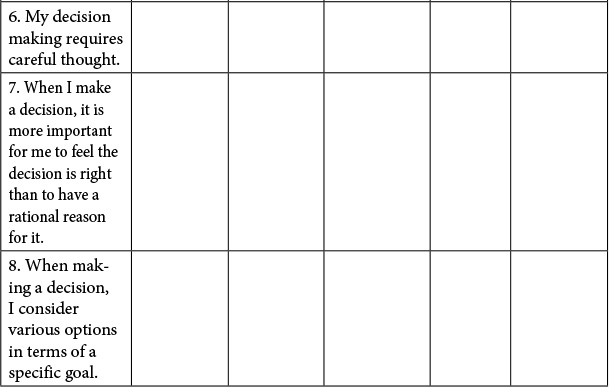
Listed below are statements describing how individuals go about making important decisions. Please indicate whether you agree or disagree with each statement.1


For the four odd-numbered questions (1, 3, 5, and 7), give yourself 1 point for each Strongly Disagree answer, 2 points for Disagree, 3 points for Neither Agree nor Disagree, 4 points for Agree, and 5 points for Strongly Agree. Add up your score. Now do the same for the even-numbered questions.
Your total for the odd-numbered items represents your Intuitive score. Your total for the even-numbered items represents your Rational score.
Your scores for each style will range between 4 and 20. The style with the higher score indicates your preferred style, but also note the difference between the two scores. The greater the difference, the stronger your preferred style is in shaping how you approach decision making. If both scores are fairly close or if your scores tend to congregate around the midpoint (this would include scores of between 10 and 14), you’re more flexible in how you approach decisions and may be more sensitive to seeing how differences in situations affect the choice of your decision style.
Decision-making style refers to the habitual patterns we tend to fall back on when faced with a decision situation. Although there are a number of different ways to classify decision styles,2 almost all include a deliberate and logical approach (which we call rational but which is also referred to as a thinking style) and an intuitive approach that relies on hunches and gut feelings (often called a feeling style).3
Your decision-making style is particularly relevant in determining how you gather information. Rational types emphasize facts, details, and rational cause-effect logic. They weigh evidence objectively and unemotionally. Well-known rationals include Albert Einstein, Ayn Rand, and Bill Gates. Intuitive types focus on possibilities and relationships between ideas. They weigh options against their personal values more than rational logic. Well-known intuitives include Albert Schweitzer, Mikhail Gorbachev, and Eleanor Roosevelt.